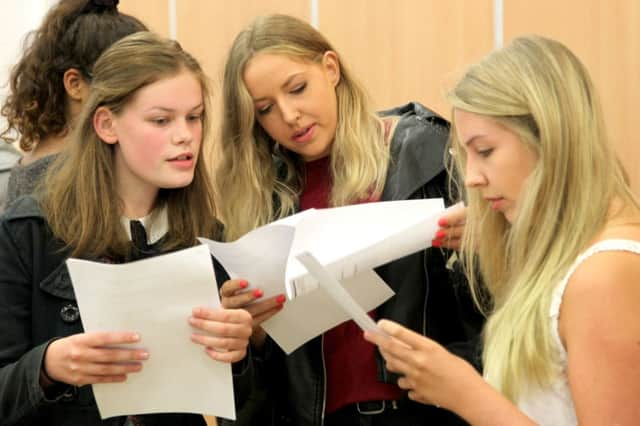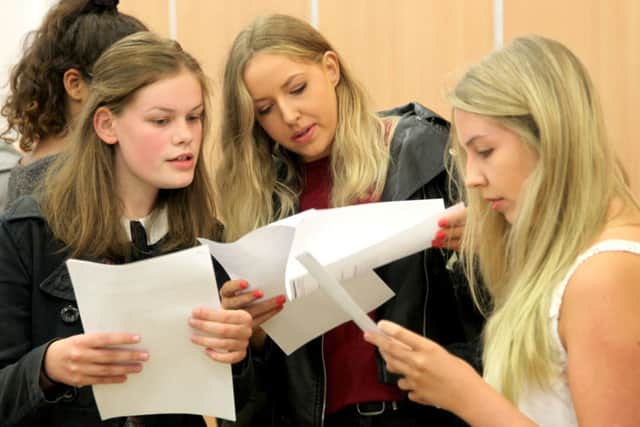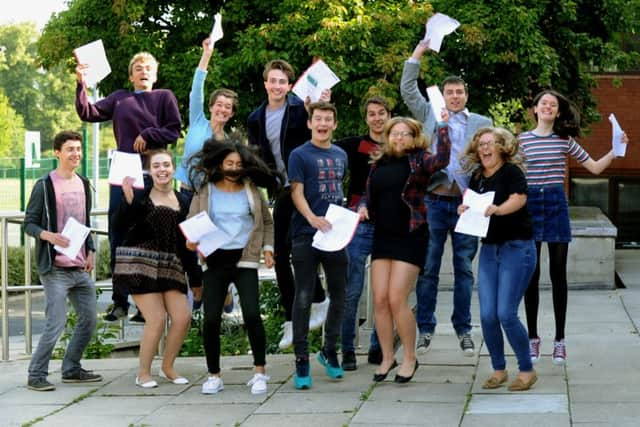A-Level results video special: Top grades fall but pass rate back up


The number of boys and girls awarded the coveted A* and A grades narrowly fell from 26 per cent to 25.9 per cent.


But the overall pass rate of A* to E grades has recovered after last year falling for the first time in 30 years, and is back to where it was in 2013 at 98.1 per cent.
Advertisement
Hide AdAdvertisement
Hide AdYorkshire fared slightly worse than the national average but it did see the country’s biggest increase in pass rates, up 0.3 per cent on last year to 98 per cent.
The number of Yorkshire students achieving an A or A* has dropped 0.5 per cent to 22.5 per cent.
Mathematics remains the most popular subject, accounting for 10.9 per cent of all entries, followed by English (10.5 per centr) and biology (7.4 per cent), the Joint Council for Qualifications (JCQ) said.


Girls have again outperformed boys by 1 per cent overall, but boys continued to earn more A* grades for the fourth year running, with 8.7 per cent achieving a top mark compared with 7.8 per cent of girls.
Advertisement
Hide AdAdvertisement
Hide AdThe number of exams taken has also risen by two per cent compared with last year, up to 850,749 despite a 1.1 per cent fall in 18-year-olds sitting the tests.
Meanwhile early Ucas figures show a record number of students have been accepted on to degree courses in the UK, with 409,410 taking up places so far - up 3% on the same point last year.
Michael Turner, JCQ’s director general, said: “The overriding message from this year’s figures is one of stability. There have been no significant changes to the system, results are stable, and entries follow expected patterns.
“Students can be confident that they have received the results they deserve.”
Advertisement
Hide AdAdvertisement
Hide AdThe results also suggest that students are trying to increase their chances of gaining entry to top universities by taking more “facilitating subjects” - traditional subjects often favoured by the institutions.
The number of exams taken in these subjects rose by 0.8% compared with last year, accounting for 51.2 per cent of all entries. The small increase comes mainly from a rise in people taking geography (up 4,188), history (up 3,717) and English literature (up 3,393).
Cherry Ridgway, curriculum and assessment specialist at the Association of School and College Leaders, said the increase in students taking facilitating subjects is down to a lack of subject choice for students and a desire to get into top universities.
She said: “I think students are looking carefully at the subjects they need to get into university and schools are helping them with good careers advice to look at what qualifications they need to take the next step.
Advertisement
Hide AdAdvertisement
Hide Ad“Schools are getting better at that and students are getting better at that.
“But there is also this element of some subjects not being able to be offered by schools due to funding pressure post-16.
“Particular subjects that stand out this year are significant drops in music and German, which show a bit of a worrying trend and one we might expect to get worse going forward given the increase of funding pressures on schools.”
Commenting on the number of exams taken rising, despite the number of entrants dropping, Andrew Hall from the AQA exam board said: “I think it is quite noticeable the impact of the increasing participation age.
Advertisement
Hide AdAdvertisement
Hide Ad“I don’t think students are taking more A-levels, I think it is actually more people staying in education, taking A-levels.”
Defending the current examination system, in light of schools minister Nick Gibbs’s call for reform, Lesley Davies, vice president of quality, standards and research at Pearson, said: “This is a rigorous system that students out there today can rely on their grades and that this is a system that works.
“And we will pick up with the Government post these A-levels.
“It is also clear we do have a system that works, it is recognised as one of the best systems in the world, the minister has acknowledged that.”
Advertisement
Hide AdAdvertisement
Hide AdThe results showed a significant increase in the number of students sitting computing exams, up 29.1% compared with last year.
Asked for the possible reason behind this, Ms Davies said: “It is great to see computing going up. Everything we see is around technology - they’re exciting industries.
“Everything we see is about coding, and it is a call to code isn’t it, nowadays if you’re a young person. So I think going into the computing industry is something you would certainly look seriously at.”